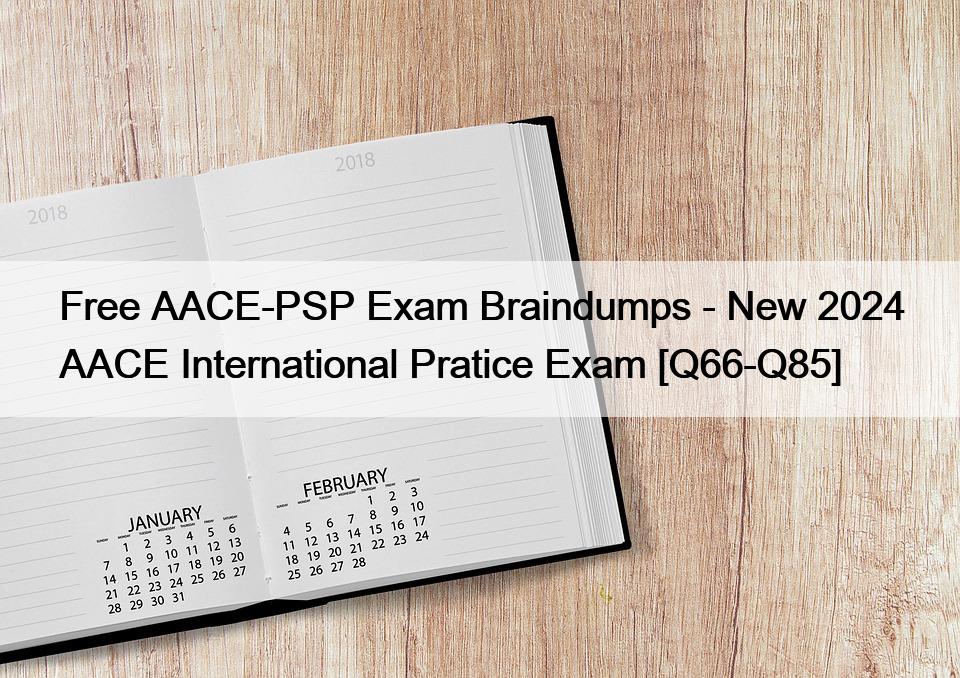Verified AACE-PSP Q&As – Pass Guarantee AACE-PSP Exam Dumps
Check the Free demo of our AACE-PSP Exam Dumps with 120 Questions
The benefit of obtaining the Planning & Scheduling Professional (PSP) Exam Certification
Certifications offered by the Association for the Advancement of Cost Engineering (AACE) have been a mark of distinction for more than thirty years, and more and more employers are requiring these certifications as a prerequisite for jobs. PSP is one of AACE’s commonly recognized qualifications that cover subjects related to the preparation and scheduling of projects. Obtaining an AACE qualification also leads to greater peer acceptance and increases job and income prospects.
While a licensed professional engineer is usually considered “certified” in any field in which he or she works (imposing self-discipline to not “practice outside one’s areas of expertise”), for both licensed engineers and unlicensed technicians, the national mood is to require certification in specialty disciplines. A welcome response to the increased power of our software tools in education and training in theory as well as practice and qualification regulated by our professional societies, such as AACE (with the PSP exam noted above and PMI (with the PMI-SP exam).
How much Planning & Scheduling Professional (PSP) Exam Cost
The cost of this exam differs according to the region from where you are applying from and the exact amount of the exam will be available when you complete the application at AACE’s website and proceed to the payment section. Roughly speaking, it costs around USD 200. Hover on to the official website of AACE by clicking Apply now button from this website and choose your region for more pricing information. Other costs may also incur like buying the PSP exam dumps and then practicing for the exam via the PSP practice exams. If you have an AACE membership or you do apply for one, the certifications will be offered to you at discounted prices.
Topics of Planning & Scheduling Professional (PSP) Exam
The Planning & Scheduling Professional (PSP) Exam consists of two main sections, Planning and Scheduling, each further broken down into two sub-sections. The core topics for each of the two sections are listed below. These contents are likely to be used for the examination. However, on any particular delivery of the test, other similar topics could also appear.
Applicants are recommended to use these contents and/or other resources including PSP exam dumps where possible to provide background information on the exam objectives. The syllabus for the Planning & Scheduling Professional (PSP) Exam is listed below with detail of each section and their topics:
1. Planning – PLANNING DEVELOPMENT
Learning Objectives:
- Understand the fundamental concepts of the planning process and its terminology.
- Effective implementation of a plan results in a schedule.
- Scaling of the planning process must be appropriate and equally weighted to each phase of work to achieve a balanced and usable product.
- When conditions change, the planning process and deliverables should be examined and updated as necessary. The plan for one phase of a project offers a pattern for developing the plan or next phase of the project as well as the project as a whole.
- Recognize that the planning process is a dynamic process repeated throughout each phase of a program or project life cycle.
Objectives covered by this section:
INPUT & DATA
- Contract Requirements
- Change management
- Delivery methods
- Identification of Stakeholders
- Contract types
- Constructability Methods
CONSIDERATIONS & CONSTRAINTS
- Stakeholder Consideration
- Project Variables
- Value Engineering
- Identification of Resources
2. Planning – PLANNING PRODUCT
Objectives covered by this section:
OUTPUT & DELIVERABLES
- Define the Project Plan
- Define the Scope of Work
- Review by Stakeholders
- Establish Cost Breakdown Structure
- Establish Work Breakdown Structure
- Phase Definition
- Baseline Plan
- Establish Organization Breakdown Structure
3. Scheduling – Schedule Development
Objectives covered by this section:
Input & Data
- Breakdown structure relationships
- Define Schedule and scope
- Schedule specification
- Feedback from stakeholders
- Cost estimation model
Creating Schedule
- Constraints and calendars
- Activities
- Schedule quality analysis
- Cost and resources
- Relationships
- Milestones
- Durations
- Types of schedule
4. Scheduling – Schedule Maintenance & Controlling
Objectives covered by this section:
Maintain Schedule
- Baseline scheduling
- Cost & resource management
- Schedule change management
- Schedule maintenance feedback
Output and Deliverables
- Schedule forecasts
- Control level schedules
- Constructability review
- Progress reports and reviews
Get professional help from our AACE-PSP Dumps PDF: https://www.dumptorrent.com/AACE-PSP-braindumps-torrent.html
